![[HorribleSubs]_Jormungand_-_23_[720p].mkv_snapshot_05.43_[2012.12.22_22.19.04] [HorribleSubs]_Jormungand_-_23_[720p].mkv_snapshot_05.43_[2012.12.22_22.19.04]](https://lh3.ggpht.com/-Mb6BFn7OosI/UNXH2426PhI/AAAAAAACVTY/L9ge2rBIuZs/%25255BHorribleSubs%25255D_Jormungand_-_23_%25255B720p%25255D.mkv_snapshot_05.43_%25255B2012.12.22_22.19.04%25255D_thumb.jpg?imgmax=800) |
![[HorribleSubs]_Jormungand_-_23_[720p].mkv_snapshot_07.25_[2012.12.22_22.21.27] [HorribleSubs]_Jormungand_-_23_[720p].mkv_snapshot_07.25_[2012.12.22_22.21.27]](https://lh4.ggpht.com/-lnapkVxraow/UNXH455XMkI/AAAAAAACVTo/PnTNP1ltwUY/%25255BHorribleSubs%25255D_Jormungand_-_23_%25255B720p%25255D.mkv_snapshot_07.25_%25255B2012.12.22_22.21.27%25255D_thumb.jpg?imgmax=800) |
![[HorribleSubs]_Jormungand_-_23_[720p].mkv_snapshot_21.02_[2012.12.22_22.39.02] [HorribleSubs]_Jormungand_-_23_[720p].mkv_snapshot_21.02_[2012.12.22_22.39.02]](https://lh4.ggpht.com/-muiVcWKLoVI/UNXH6YKFPvI/AAAAAAACVT8/jeHK7rNAHHw/%25255BHorribleSubs%25255D_Jormungand_-_23_%25255B720p%25255D.mkv_snapshot_21.02_%25255B2012.12.22_22.39.02%25255D_thumb.jpg?imgmax=800) |
In some ways, this may just be the hardest blog post I’ve ever had to write.
I’m really walking on eggshells with this one. It’s a bit of a quandary trying to figure out what I can and can’t say, because it’s hard to separate what I know because I knew it at the time I was reading the Jormungand manga from what I know because I finished reading the Jormungand manga. Just because something seems obvious to me now doesn’t mean it was obvious to me in real-time. I suppose it’s safe enough to say this – I hope you’ve been paying close attention while watching, because you know everything you need to know. And the broad observations I’ve doled out over the last 23 episodes about who to look at and who to listen to are no less relevant now than they were at the time.
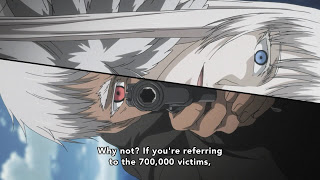 What I can’t do, really, is go into the details of Koko’s plan, because they’ve been intentionally left vague. And as much as I’m keen to, I think an in-depth discussion of the moral foundation of said plan would be inadvisable too, for some reasons that are apparent and some that aren’t. In broad terms I think a couple of things can be stipulated: first, based on what we know, you can certainly poke holes in the feasibility of Plan Jormungand. I’ve said before, but Jormungand is a series that uses the absurd to cast light on the human condition – and given that, it’s hardly surprising that Koko’s plan isn’t photo-realistic but rather larger-than-life, almost Shakespearean. I did offer this in response to some comments last week, though – did you really think Koko would build her entire plan around knocking a few aircraft and missiles out of the sky? The logistics of Jormungand are often fantastical, but the character behavior is dead-on. Does that really sound like something Koko would do?
What I can’t do, really, is go into the details of Koko’s plan, because they’ve been intentionally left vague. And as much as I’m keen to, I think an in-depth discussion of the moral foundation of said plan would be inadvisable too, for some reasons that are apparent and some that aren’t. In broad terms I think a couple of things can be stipulated: first, based on what we know, you can certainly poke holes in the feasibility of Plan Jormungand. I’ve said before, but Jormungand is a series that uses the absurd to cast light on the human condition – and given that, it’s hardly surprising that Koko’s plan isn’t photo-realistic but rather larger-than-life, almost Shakespearean. I did offer this in response to some comments last week, though – did you really think Koko would build her entire plan around knocking a few aircraft and missiles out of the sky? The logistics of Jormungand are often fantastical, but the character behavior is dead-on. Does that really sound like something Koko would do?
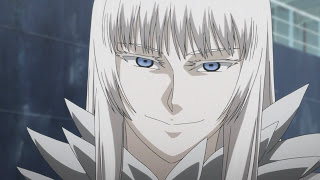 Second, on the subject of the morals of what Koko is proposing, while I once again must avoid the details I’ll repeat my comment from last week – which character have I been most sympathetic to since the series started? I would have thought it was obvious in my Jormungand posts, but if not, my view on Koko’s grand vision should be clear from the volume of blogs I’ve posted. I think I can say this, too, without stepping outside the bounds of what we’ve been clearly shown on-screen already: I find it especially distasteful that Koko – whatever else you may think of Plan Jormungand – continues to walk around with a smile on her face as she plans what she does. The image of she and Miami laughing it up in the hot tub is one of the most chilling of the series, and I think it’s meant to be. Listen carefully to the speech she gives Jonah in trying to convince him – the entirety of it (with one notable exception which I’ll get to in a minute) is about her. About her pain, and her anger, and her just compassion in deciding to save the world rather than destroy it. Koko is probably right that the next world war will be fought over water, not oil – but it doesn’t sound like it’s the world that’s foremost on her mind at the moment she makes that speech.
Second, on the subject of the morals of what Koko is proposing, while I once again must avoid the details I’ll repeat my comment from last week – which character have I been most sympathetic to since the series started? I would have thought it was obvious in my Jormungand posts, but if not, my view on Koko’s grand vision should be clear from the volume of blogs I’ve posted. I think I can say this, too, without stepping outside the bounds of what we’ve been clearly shown on-screen already: I find it especially distasteful that Koko – whatever else you may think of Plan Jormungand – continues to walk around with a smile on her face as she plans what she does. The image of she and Miami laughing it up in the hot tub is one of the most chilling of the series, and I think it’s meant to be. Listen carefully to the speech she gives Jonah in trying to convince him – the entirety of it (with one notable exception which I’ll get to in a minute) is about her. About her pain, and her anger, and her just compassion in deciding to save the world rather than destroy it. Koko is probably right that the next world war will be fought over water, not oil – but it doesn’t sound like it’s the world that’s foremost on her mind at the moment she makes that speech.
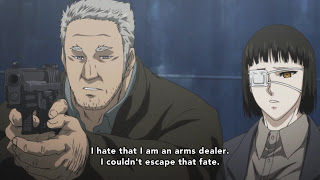 It’s an interesting twist, but it’s actually Chiquita who gets off the most memorable line of the episode: “Compared to a man who’s smiling all the time, this is way better.” It’s a reference to Jonah, who’s facial contortions in the back seat of Kasper’s car reflect his agony in leaving Koko. And of course to Kasper, said smiling man – though it could just as easily apply to Koko, or to herself. I think the meaning here is simple – unlike those perpetually smiling adults, Jonah isn’t dead inside – not yet. He belittles his own intelligence, but the Hekmatyar siblings and Dr. Miami have the right of it – Jonah is a smart boy, even if he’s not good with his studies. He’s smart with people, and with right and wrong – and he smells the wrongness on Koko so intensely that it forces him to leave her side. I don’t imagine for a moment that it was easy for him to do that, given that she’s likely the only person in the world he loves, and I don’t doubt for a moment that Koko was telling the truth when she told Jonah he was the only one she loved. Yet leave her side he did, even as most of Koko’s team relays their own unique reasons for staying with her.
It’s an interesting twist, but it’s actually Chiquita who gets off the most memorable line of the episode: “Compared to a man who’s smiling all the time, this is way better.” It’s a reference to Jonah, who’s facial contortions in the back seat of Kasper’s car reflect his agony in leaving Koko. And of course to Kasper, said smiling man – though it could just as easily apply to Koko, or to herself. I think the meaning here is simple – unlike those perpetually smiling adults, Jonah isn’t dead inside – not yet. He belittles his own intelligence, but the Hekmatyar siblings and Dr. Miami have the right of it – Jonah is a smart boy, even if he’s not good with his studies. He’s smart with people, and with right and wrong – and he smells the wrongness on Koko so intensely that it forces him to leave her side. I don’t imagine for a moment that it was easy for him to do that, given that she’s likely the only person in the world he loves, and I don’t doubt for a moment that Koko was telling the truth when she told Jonah he was the only one she loved. Yet leave her side he did, even as most of Koko’s team relays their own unique reasons for staying with her.
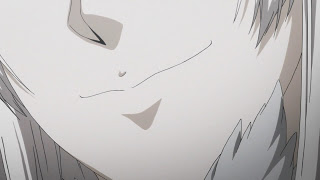 There are other elements of this episode in particular I find interesting, not least of which is how pedestrian Kasper’s way of thinking is when compared to his sister’s. I think this is the point Koko is trying to make when she gives Bookman a demonstration of her new powers, placing him in harm’s way and providing the means to his salvation all in the same motion. In the process she also causes the downfall of Plame, the man who’s a thorn in both their sides. Bookman is the eternal chessmaster, always believing he can use any piece on the board to his own advantage – but now he’s seen first-hand that he’s the pawn himself. In a sense I think it was a token of respect from Koko to do this, because it expresses a belief that Bookman is smart (and venal) enough to see the possibilities in what she’s doing.
There are other elements of this episode in particular I find interesting, not least of which is how pedestrian Kasper’s way of thinking is when compared to his sister’s. I think this is the point Koko is trying to make when she gives Bookman a demonstration of her new powers, placing him in harm’s way and providing the means to his salvation all in the same motion. In the process she also causes the downfall of Plame, the man who’s a thorn in both their sides. Bookman is the eternal chessmaster, always believing he can use any piece on the board to his own advantage – but now he’s seen first-hand that he’s the pawn himself. In a sense I think it was a token of respect from Koko to do this, because it expresses a belief that Bookman is smart (and venal) enough to see the possibilities in what she’s doing.
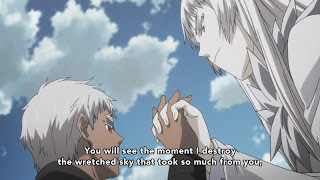 Everyone will have to make up their own minds about all this after the finale, and I’m sure it’s going to generate a lively discussion and debate. For me, as always, Jormungand is about the characters – the boy and the arms dealer he travels with, and the odd group that surrounds them. As fascinating as all this plot is, it’s most interesting for what it reveals about the characters themselves. That’s the main reason I’m here, and has been from the very first chapter.
Everyone will have to make up their own minds about all this after the finale, and I’m sure it’s going to generate a lively discussion and debate. For me, as always, Jormungand is about the characters – the boy and the arms dealer he travels with, and the odd group that surrounds them. As fascinating as all this plot is, it’s most interesting for what it reveals about the characters themselves. That’s the main reason I’m here, and has been from the very first chapter.
![[HorribleSubs]_Jormungand_-_23_[720p].mkv_snapshot_05.50_[2012.12.22_22.19.10] [HorribleSubs]_Jormungand_-_23_[720p].mkv_snapshot_05.50_[2012.12.22_22.19.10]](https://lh5.ggpht.com/-BICxkjozSm8/UNXH8hoxBAI/AAAAAAACVUI/VpJF0xlgv8A/%25255BHorribleSubs%25255D_Jormungand_-_23_%25255B720p%25255D.mkv_snapshot_05.50_%25255B2012.12.22_22.19.10%25255D_thumb.jpg?imgmax=800) |
![[HorribleSubs]_Jormungand_-_23_[720p].mkv_snapshot_06.01_[2012.12.22_22.19.21] [HorribleSubs]_Jormungand_-_23_[720p].mkv_snapshot_06.01_[2012.12.22_22.19.21]](https://lh3.ggpht.com/-fn5p3SFPZXo/UNXH-YM0G1I/AAAAAAACVUY/xDIYaonRon8/%25255BHorribleSubs%25255D_Jormungand_-_23_%25255B720p%25255D.mkv_snapshot_06.01_%25255B2012.12.22_22.19.21%25255D_thumb.jpg?imgmax=800) |
![[HorribleSubs]_Jormungand_-_23_[720p].mkv_snapshot_06.05_[2012.12.22_22.19.26] [HorribleSubs]_Jormungand_-_23_[720p].mkv_snapshot_06.05_[2012.12.22_22.19.26]](https://lh3.ggpht.com/-wXvS2J1lP5M/UNXIAcL8npI/AAAAAAACVUs/ktFqXU7IIUo/%25255BHorribleSubs%25255D_Jormungand_-_23_%25255B720p%25255D.mkv_snapshot_06.05_%25255B2012.12.22_22.19.26%25255D_thumb.jpg?imgmax=800) |
![[HorribleSubs]_Jormungand_-_23_[720p].mkv_snapshot_06.29_[2012.12.22_22.20.09] [HorribleSubs]_Jormungand_-_23_[720p].mkv_snapshot_06.29_[2012.12.22_22.20.09]](https://lh6.ggpht.com/-VqTgezkhHGo/UNXICbED_PI/AAAAAAACVU8/ZJ4U1Ue4aoY/%25255BHorribleSubs%25255D_Jormungand_-_23_%25255B720p%25255D.mkv_snapshot_06.29_%25255B2012.12.22_22.20.09%25255D_thumb.jpg?imgmax=800) |
![[HorribleSubs]_Jormungand_-_23_[720p].mkv_snapshot_06.40_[2012.12.22_22.20.20] [HorribleSubs]_Jormungand_-_23_[720p].mkv_snapshot_06.40_[2012.12.22_22.20.20]](https://lh5.ggpht.com/-wnteN2BAn5U/UNXIFVtSykI/AAAAAAACVVM/BcFEZI1LoIo/%25255BHorribleSubs%25255D_Jormungand_-_23_%25255B720p%25255D.mkv_snapshot_06.40_%25255B2012.12.22_22.20.20%25255D_thumb.jpg?imgmax=800) |
![[HorribleSubs]_Jormungand_-_23_[720p].mkv_snapshot_07.07_[2012.12.22_22.20.48] [HorribleSubs]_Jormungand_-_23_[720p].mkv_snapshot_07.07_[2012.12.22_22.20.48]](https://lh6.ggpht.com/-7Zv6dYjLyVY/UNXIIQtL65I/AAAAAAACVVc/pb1bPMdVrcQ/%25255BHorribleSubs%25255D_Jormungand_-_23_%25255B720p%25255D.mkv_snapshot_07.07_%25255B2012.12.22_22.20.48%25255D_thumb.jpg?imgmax=800) |
![[HorribleSubs]_Jormungand_-_23_[720p].mkv_snapshot_07.23_[2012.12.22_22.21.25] [HorribleSubs]_Jormungand_-_23_[720p].mkv_snapshot_07.23_[2012.12.22_22.21.25]](https://lh6.ggpht.com/-DjTxaanL_b4/UNXIKburVBI/AAAAAAACVVs/-Z68IEZvRHk/%25255BHorribleSubs%25255D_Jormungand_-_23_%25255B720p%25255D.mkv_snapshot_07.23_%25255B2012.12.22_22.21.25%25255D_thumb.jpg?imgmax=800) |
![[HorribleSubs]_Jormungand_-_23_[720p].mkv_snapshot_08.05_[2012.12.22_22.22.18] [HorribleSubs]_Jormungand_-_23_[720p].mkv_snapshot_08.05_[2012.12.22_22.22.18]](https://lh4.ggpht.com/-fYss8FNcpl8/UNXIMbOZaXI/AAAAAAACVV4/rkIbKCoUw2c/%25255BHorribleSubs%25255D_Jormungand_-_23_%25255B720p%25255D.mkv_snapshot_08.05_%25255B2012.12.22_22.22.18%25255D_thumb.jpg?imgmax=800) |
![[HorribleSubs]_Jormungand_-_23_[720p].mkv_snapshot_08.39_[2012.12.22_22.23.03] [HorribleSubs]_Jormungand_-_23_[720p].mkv_snapshot_08.39_[2012.12.22_22.23.03]](https://lh6.ggpht.com/-C1MRqKQ73iw/UNXIOOGc4kI/AAAAAAACVWM/Mll9kteZZYY/%25255BHorribleSubs%25255D_Jormungand_-_23_%25255B720p%25255D.mkv_snapshot_08.39_%25255B2012.12.22_22.23.03%25255D_thumb.jpg?imgmax=800) |
![[HorribleSubs]_Jormungand_-_23_[720p].mkv_snapshot_09.02_[2012.12.22_22.23.27] [HorribleSubs]_Jormungand_-_23_[720p].mkv_snapshot_09.02_[2012.12.22_22.23.27]](https://lh5.ggpht.com/-UuVXE-PTgYs/UNXIQgBZcbI/AAAAAAACVWY/a0M4iVWgYQ0/%25255BHorribleSubs%25255D_Jormungand_-_23_%25255B720p%25255D.mkv_snapshot_09.02_%25255B2012.12.22_22.23.27%25255D_thumb.jpg?imgmax=800) |
![[HorribleSubs]_Jormungand_-_23_[720p].mkv_snapshot_10.25_[2012.12.22_22.24.50] [HorribleSubs]_Jormungand_-_23_[720p].mkv_snapshot_10.25_[2012.12.22_22.24.50]](https://lh5.ggpht.com/-25BjXAnBrzo/UNXISvjtEfI/AAAAAAACVWo/1lQN0ohplkg/%25255BHorribleSubs%25255D_Jormungand_-_23_%25255B720p%25255D.mkv_snapshot_10.25_%25255B2012.12.22_22.24.50%25255D_thumb%25255B2%25255D.jpg?imgmax=800) |
![[HorribleSubs]_Jormungand_-_23_[720p].mkv_snapshot_12.42_[2012.12.22_22.28.15] [HorribleSubs]_Jormungand_-_23_[720p].mkv_snapshot_12.42_[2012.12.22_22.28.15]](https://lh6.ggpht.com/-qGZ35eTgfRg/UNXIU8HxygI/AAAAAAACVW8/dtKW8egVcvg/%25255BHorribleSubs%25255D_Jormungand_-_23_%25255B720p%25255D.mkv_snapshot_12.42_%25255B2012.12.22_22.28.15%25255D_thumb%25255B2%25255D.jpg?imgmax=800) |
![[HorribleSubs]_Jormungand_-_23_[720p].mkv_snapshot_12.50_[2012.12.22_22.28.32] [HorribleSubs]_Jormungand_-_23_[720p].mkv_snapshot_12.50_[2012.12.22_22.28.32]](https://lh3.ggpht.com/-QFlhz9CNSFw/UNXIWs-zgNI/AAAAAAACVXM/FsOgg2AkAMo/%25255BHorribleSubs%25255D_Jormungand_-_23_%25255B720p%25255D.mkv_snapshot_12.50_%25255B2012.12.22_22.28.32%25255D_thumb%25255B1%25255D.jpg?imgmax=800) |
![[HorribleSubs]_Jormungand_-_23_[720p].mkv_snapshot_13.29_[2012.12.22_22.29.11] [HorribleSubs]_Jormungand_-_23_[720p].mkv_snapshot_13.29_[2012.12.22_22.29.11]](https://lh6.ggpht.com/-y8xSmuzdQ2A/UNXIYuIq7hI/AAAAAAACVXc/wp3wFKqOaCs/%25255BHorribleSubs%25255D_Jormungand_-_23_%25255B720p%25255D.mkv_snapshot_13.29_%25255B2012.12.22_22.29.11%25255D_thumb%25255B1%25255D.jpg?imgmax=800) |
![[HorribleSubs]_Jormungand_-_23_[720p].mkv_snapshot_14.49_[2012.12.22_22.30.31] [HorribleSubs]_Jormungand_-_23_[720p].mkv_snapshot_14.49_[2012.12.22_22.30.31]](https://lh6.ggpht.com/-Sadp7rniALk/UNXIamGqipI/AAAAAAACVXo/lFnGYpb7pwM/%25255BHorribleSubs%25255D_Jormungand_-_23_%25255B720p%25255D.mkv_snapshot_14.49_%25255B2012.12.22_22.30.31%25255D_thumb%25255B2%25255D.jpg?imgmax=800) |
![[HorribleSubs]_Jormungand_-_23_[720p].mkv_snapshot_14.59_[2012.12.22_22.30.41] [HorribleSubs]_Jormungand_-_23_[720p].mkv_snapshot_14.59_[2012.12.22_22.30.41]](https://lh3.ggpht.com/-DWgHD_lSf6U/UNXIcVuwp7I/AAAAAAACVX4/wBgdz0gSZhI/%25255BHorribleSubs%25255D_Jormungand_-_23_%25255B720p%25255D.mkv_snapshot_14.59_%25255B2012.12.22_22.30.41%25255D_thumb%25255B1%25255D.jpg?imgmax=800) |
![[HorribleSubs]_Jormungand_-_23_[720p].mkv_snapshot_16.12_[2012.12.22_22.32.15] [HorribleSubs]_Jormungand_-_23_[720p].mkv_snapshot_16.12_[2012.12.22_22.32.15]](https://lh3.ggpht.com/-h_TbdlYLcYw/UNXIeero6kI/AAAAAAACVYM/nQu2HfV0VqM/%25255BHorribleSubs%25255D_Jormungand_-_23_%25255B720p%25255D.mkv_snapshot_16.12_%25255B2012.12.22_22.32.15%25255D_thumb%25255B1%25255D.jpg?imgmax=800) |
![[HorribleSubs]_Jormungand_-_23_[720p].mkv_snapshot_17.03_[2012.12.22_22.33.13] [HorribleSubs]_Jormungand_-_23_[720p].mkv_snapshot_17.03_[2012.12.22_22.33.13]](https://lh4.ggpht.com/-YrtvGy_BTTQ/UNXIgYhVKGI/AAAAAAACVYY/DZZyRJe-4CY/%25255BHorribleSubs%25255D_Jormungand_-_23_%25255B720p%25255D.mkv_snapshot_17.03_%25255B2012.12.22_22.33.13%25255D_thumb.jpg?imgmax=800) |
![[HorribleSubs]_Jormungand_-_23_[720p].mkv_snapshot_17.12_[2012.12.22_22.33.37] [HorribleSubs]_Jormungand_-_23_[720p].mkv_snapshot_17.12_[2012.12.22_22.33.37]](https://lh3.ggpht.com/-UzZ1j-zf9bs/UNXIiBLpBLI/AAAAAAACVYo/XtLfwI0a9mw/%25255BHorribleSubs%25255D_Jormungand_-_23_%25255B720p%25255D.mkv_snapshot_17.12_%25255B2012.12.22_22.33.37%25255D_thumb.jpg?imgmax=800) |
![[HorribleSubs]_Jormungand_-_23_[720p].mkv_snapshot_17.36_[2012.12.22_22.35.17] [HorribleSubs]_Jormungand_-_23_[720p].mkv_snapshot_17.36_[2012.12.22_22.35.17]](https://lh6.ggpht.com/-4N9ND1_Q2FI/UNXIj_IJaPI/AAAAAAACVY4/c1h3ph2uV0o/%25255BHorribleSubs%25255D_Jormungand_-_23_%25255B720p%25255D.mkv_snapshot_17.36_%25255B2012.12.22_22.35.17%25255D_thumb.jpg?imgmax=800) |
![[HorribleSubs]_Jormungand_-_23_[720p].mkv_snapshot_17.45_[2012.12.22_22.34.39] [HorribleSubs]_Jormungand_-_23_[720p].mkv_snapshot_17.45_[2012.12.22_22.34.39]](https://lh6.ggpht.com/-BTJimKU-VnQ/UNXIl5GlAqI/AAAAAAACVZM/oTqlp7mIYBs/%25255BHorribleSubs%25255D_Jormungand_-_23_%25255B720p%25255D.mkv_snapshot_17.45_%25255B2012.12.22_22.34.39%25255D_thumb.jpg?imgmax=800) |
![[HorribleSubs]_Jormungand_-_23_[720p].mkv_snapshot_17.46_[2012.12.22_22.35.27] [HorribleSubs]_Jormungand_-_23_[720p].mkv_snapshot_17.46_[2012.12.22_22.35.27]](https://lh3.ggpht.com/-dl8HrHSfg4E/UNXIoNGdOFI/AAAAAAACVZY/QFOxGXFM574/%25255BHorribleSubs%25255D_Jormungand_-_23_%25255B720p%25255D.mkv_snapshot_17.46_%25255B2012.12.22_22.35.27%25255D_thumb.jpg?imgmax=800) |
![[HorribleSubs]_Jormungand_-_23_[720p].mkv_snapshot_18.29_[2012.12.22_22.36.10] [HorribleSubs]_Jormungand_-_23_[720p].mkv_snapshot_18.29_[2012.12.22_22.36.10]](https://lh4.ggpht.com/-owkRjaOkMS8/UNXIp0KjGPI/AAAAAAACVZo/GxJ7H6USW50/%25255BHorribleSubs%25255D_Jormungand_-_23_%25255B720p%25255D.mkv_snapshot_18.29_%25255B2012.12.22_22.36.10%25255D_thumb.jpg?imgmax=800) |
![[HorribleSubs]_Jormungand_-_23_[720p].mkv_snapshot_19.08_[2012.12.22_22.37.00] [HorribleSubs]_Jormungand_-_23_[720p].mkv_snapshot_19.08_[2012.12.22_22.37.00]](https://lh4.ggpht.com/-K9g-DJ0b6HM/UNXIrq4kxzI/AAAAAAACVZ8/uo5HYYUck8A/%25255BHorribleSubs%25255D_Jormungand_-_23_%25255B720p%25255D.mkv_snapshot_19.08_%25255B2012.12.22_22.37.00%25255D_thumb.jpg?imgmax=800) |
![[HorribleSubs]_Jormungand_-_23_[720p].mkv_snapshot_20.39_[2012.12.22_22.38.39] [HorribleSubs]_Jormungand_-_23_[720p].mkv_snapshot_20.39_[2012.12.22_22.38.39]](https://lh3.ggpht.com/-EJnJAzJbDlo/UNXItf_YyjI/AAAAAAACVaI/k2s3wJucUp8/%25255BHorribleSubs%25255D_Jormungand_-_23_%25255B720p%25255D.mkv_snapshot_20.39_%25255B2012.12.22_22.38.39%25255D_thumb.jpg?imgmax=800) |
![[HorribleSubs]_Jormungand_-_23_[720p].mkv_snapshot_20.50_[2012.12.22_22.38.50] [HorribleSubs]_Jormungand_-_23_[720p].mkv_snapshot_20.50_[2012.12.22_22.38.50]](https://lh4.ggpht.com/-j3NgFEEBgSg/UNXIvThJL-I/AAAAAAACVac/KbUBV9eqsNA/%25255BHorribleSubs%25255D_Jormungand_-_23_%25255B720p%25255D.mkv_snapshot_20.50_%25255B2012.12.22_22.38.50%25255D_thumb.jpg?imgmax=800) |
![[HorribleSubs]_Jormungand_-_23_[720p].mkv_snapshot_21.22_[2012.12.22_22.39.24] [HorribleSubs]_Jormungand_-_23_[720p].mkv_snapshot_21.22_[2012.12.22_22.39.24]](https://lh4.ggpht.com/-0jVBt1vyGWo/UNXIxPt6nNI/AAAAAAACVao/zbvg0s8r9x8/%25255BHorribleSubs%25255D_Jormungand_-_23_%25255B720p%25255D.mkv_snapshot_21.22_%25255B2012.12.22_22.39.24%25255D_thumb.jpg?imgmax=800) |
![[HorribleSubs]_Jormungand_-_23_[720p].mkv_snapshot_21.34_[2012.12.22_22.39.34] [HorribleSubs]_Jormungand_-_23_[720p].mkv_snapshot_21.34_[2012.12.22_22.39.34]](https://lh3.ggpht.com/-bAnvuYK1dNw/UNXIzCvdGEI/AAAAAAACVa8/M_EEU_2Kxjc/%25255BHorribleSubs%25255D_Jormungand_-_23_%25255B720p%25255D.mkv_snapshot_21.34_%25255B2012.12.22_22.39.34%25255D_thumb.jpg?imgmax=800) |
![[HorribleSubs]_Jormungand_-_23_[720p].mkv_snapshot_21.46_[2012.12.22_22.39.56] [HorribleSubs]_Jormungand_-_23_[720p].mkv_snapshot_21.46_[2012.12.22_22.39.56]](https://lh6.ggpht.com/-Y7gyTPG8Bsw/UNXI1Wi7a4I/AAAAAAACVbM/Q08LJHAqu9U/%25255BHorribleSubs%25255D_Jormungand_-_23_%25255B720p%25255D.mkv_snapshot_21.46_%25255B2012.12.22_22.39.56%25255D_thumb.jpg?imgmax=800) |
![[HorribleSubs]_Jormungand_-_23_[720p].mkv_snapshot_21.59_[2012.12.22_22.40.16] [HorribleSubs]_Jormungand_-_23_[720p].mkv_snapshot_21.59_[2012.12.22_22.40.16]](https://lh4.ggpht.com/-Dhoihg0sgeo/UNXI3FdmM4I/AAAAAAACVbY/HW7X3K-Jhx0/%25255BHorribleSubs%25255D_Jormungand_-_23_%25255B720p%25255D.mkv_snapshot_21.59_%25255B2012.12.22_22.40.16%25255D_thumb.jpg?imgmax=800) |


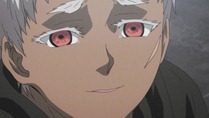
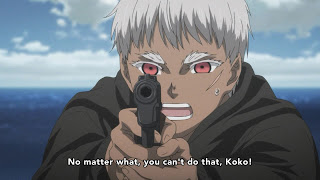

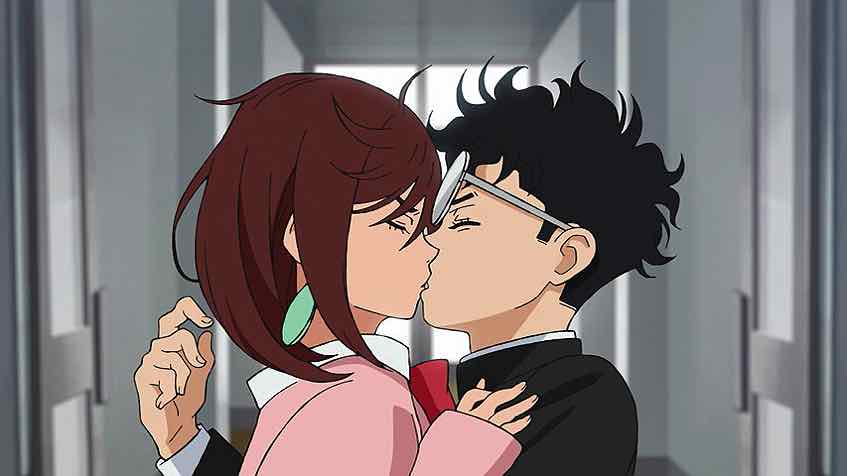
Litho
December 22, 2012 at 3:21 pmI stopped watching (and reading) Jormungand some time ago. Nothing against the series, just didn't have much time on my hands. I assume, from looking at the screencaps and reading your write-up, that this won't be ending with Jonah putting a bullet in Kasper's head? Sad, that.
Anonymous
December 22, 2012 at 4:22 pmI agree witch your assessment Enzo that it's not the World she's doing all this for.
Personally I got more the Impression that this all is about personal revenge on all those whose source for wealth, power or influence came from war.
Both her and Miami had been forced to partake in the warbusiness without any chance to get out and both resent the those who forced and kept them in this situation.
This Plan was probably just the best possible way to get their revenge on all those "Warlords" by destroying their business and rendering them completly useless.
That fact that this plan gives birth to peace seems more to be a pleasent side effect then an actual goal. As long as it would get the their revenge any other Consequences resulting from the plan would have been as good as peace.
this nocturnal interloper
December 22, 2012 at 4:58 pmWhile I can see that Jonah is this series' Ishmael, I find that the mileage always varies for audience stand-ins. He seems to be the representation of conventional expectations in the face of an absurd world, though none of the cast seems particularly well-defined save for the specific broad strokes used to mark their characters. I've only read the manga up to its current translation and the anime up to this episode. The anime though of its use of music has given a bit more to Jonah's character where there's almost this lazy Cowboy Bebop feel of ruminative distance and languor.
Karmafan
December 23, 2012 at 2:25 amIt almost seems like she is doing this to punish her father for taking away her innocense and future life. Making koko (and her brother) human monsters.
I wonder if Kasper and his team will end up trying to cock block Koko and her plan? Certainely it will put a huge damper on the family business and profits.
admin
December 23, 2012 at 2:36 amNot to mention making the family picnics very tense.